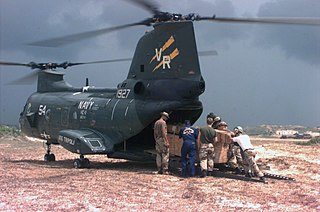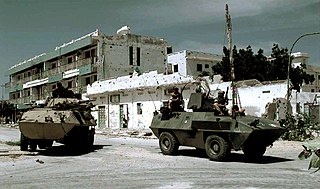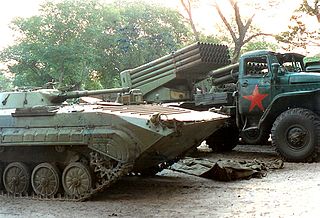| UN Security Council Resolution 865 | |
|---|---|
 Flag of the Somali police force | |
| Date | 22 September 1993 |
| Meeting no. | 3,280 |
| Code | S/RES/865 (Document) |
| Subject | The situation in Somalia |
Voting summary | 15 voted for None voted against None abstained |
| Result | Adopted |
| Security Council composition | |
Permanent members | |
Non-permanent members | |
United Nations Security Council resolution 865, adopted unanimously on 22 September 1993, after reaffirming resolutions 733 (1992), 746 (1992), 751 (1992), 767 (1992), 775 (1992), 794 (1992), 814 (1993) and 837 (1993), the Council addressed the process of national reconciliation and political settlement in Somalia, during the civil war. [1]

United Nations Security Council resolution 733, adopted unanimously on 23 January 1992, after expressing its alarm at the situation in Somalia regarding the heavy loss of life, destruction to property and threat to regional stability, the Council, acting under Chapter VII of the United Nations Charter, decided to place a "general and complete" arms embargo on the country for the purposes of establishing peace and stability. The situation was brought to the attention of the Security Council by the Somali government.

United Nations Security Council resolution 746, adopted unanimously on 17 March 1992, after reaffirming Resolution 733 (1992), noting a ceasefire agreement in Mogadishu and a report by the Secretary-General, the Council urged the continuation of the United Nations humanitarian work in Somalia and strongly supported the Secretary-General's decision to dispatch a technical team there.
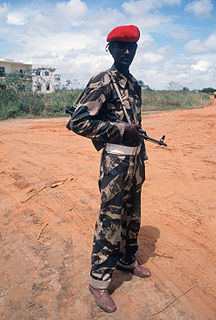
United Nations Security Council resolution 751 is a United Nations Security Council resolution adopted unanimously on April 24, 1992, after reaffirming resolutions 733 (1992) and 746 (1992) and considering a report by the Secretary-General Boutros Boutros-Ghali on the ongoing civil war in Somalia. The Council established a United Nations Operation in Somalia I with an immediate deployment of 50 observers in the capital Mogadishu to monitor the ceasefire.
Contents
The Council stressed the importance of continuing the peace process initiated by the Addis Ababa agreement, welcoming the efforts of the Organisation of African Unity (OAU), Arab League and the Organisation of the Islamic Conference. The international community would help the country achieve peace, but ultimately it was the Somali people who were responsible for the reconciliation and reconstruction of their country. Meanwhile, the improvement of the situation with United Nations Operation in Somalia II (UNOSOM II) was welcomed, particularly with the eradication of starvation, establishment of a large number of district councils, opening of schools and the resumption of normal life for most Somali people. At the same time, the Council recognised the need to continue efforts to achieve reconciliation and establish democracy, and in this respect all parties were urged to show their political will to achieve the aforementioned.

Addis Ababa or Addis Abeba, also known as Finfinne , is the capital and largest city of Ethiopia. According to the 2007 census, the city has a population of 2,739,551 inhabitants.

The Organisation of African Unity was an intergovernmental organization established on 25 May 1963 in Addis Ababa, Ethiopia, with 32 signatory governments. One of the main heads for OAU's establishment was Kwame Nkrumah of Ghana. It was disbanded on 9 July 2002 by its last chairperson, South African President Thabo Mbeki, and replaced by the African Union (AU). Some of the key aims of the OAU were to encourage political and economic integration among member states, and to eradicate colonialism and neo-colonialism from the African continent. Although it achieved some success, there were also differences of opinion as to how that was going to be achieved.
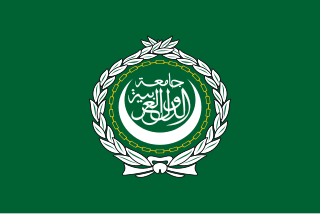
The Arab League, formally the League of Arab States, is a regional organization of Arab states in and around North Africa, the Horn of Africa and Arabia. It was formed in Cairo on 22 March 1945 with six members: Egypt, Iraq, Transjordan, Lebanon, Saudi Arabia, and Syria. Yemen joined as a member on 5 May 1945. Currently, the League has 22 members, but Syria's participation has been suspended since November 2011, as a consequence of government repression during the Syrian Civil War.
Concern was then expressed at reports of violence in the capital Mogadishu, violence against UNOSOM II and the lack of law enforcement and legal institutions in the country. The Council reiterated its request to the Secretary-General Boutros Boutros-Ghali to assist with the re-establishment of the Somali police and the restoration of peace, stability and order.
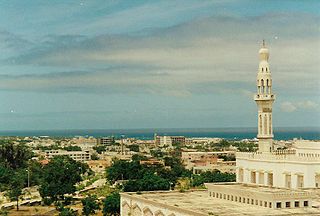
Mogadishu, locally known as Xamar or Hamar, is the capital and most populous city of Somalia. Located in the coastal Banadir region on the Somali Sea, the city has served as an important port for millennia. The original inhabitants are known as reer xamar. As of 2017, it had a population of 2,425,000 residents. Mogadishu is the nearest foreign mainland city to Seychelles, at a distance of 835 mi (1,344 km) over the Somali Sea.

The police are a constituted body of persons empowered by a state to enforce the law, to protect the lives, liberty and possessions of citizens, and to prevent crime and civil disorder. Their lawful powers include arrest and the legitimized use of force. The term is most commonly associated with the police forces of a sovereign state that are authorized to exercise the police power of that state within a defined legal or territorial area of responsibility. Police forces are often defined as being separate from the military and other organizations involved in the defense of the state against foreign aggressors; however, gendarmerie are military units charged with civil policing. Police forces are usually public sector services, funded through taxes.

Boutros Boutros-Ghali was an Egyptian politician and diplomat who was the sixth Secretary-General of the United Nations (UN) from January 1992 to December 1996. An academic and former Vice Foreign Minister of Egypt, Boutros-Ghali oversaw the UN over a period coinciding with several world crises, including the breakup of Yugoslavia and the Rwandan genocide. He was then the first Secretary-General of the Organisation internationale de la Francophonie from 16 November 1997 to 31 December 2002.
The improvement of the conditions and the beginning of the rebuilding of the country were praised, while attacks on UNOSOM II were condemned, stating that the perpetrators would be held individually responsible. The Council affirmed the importance it attached to the UNOSOM II mission including facilitation of humanitarian assistance, restoration of law and order and national reconciliation in a free, democratic and sovereign Somalia so that it could complete its mission by March 1995. The Secretary-General was asked to draw a detailed plan concerning the future strategy of the mission and redouble his efforts to achieve reconciliation at all levels. Member States were invited to help by staffing UNOSOM II positions.

Humanitarian aid is material and logistic assistance to people who need help. It is usually short-term help until the long-term help by government and other institutions replaces it. Among the people in need are the homeless, refugees, and victims of natural disasters, wars and famines. Humanitarian aid is material or logistical assistance provided for humanitarian purposes, typically in response to humanitarian relief efforts including natural disasters and man-made disaster. The primary objective of humanitarian aid is to save lives, alleviate suffering, and maintain human dignity. It may therefore be distinguished from development aid, which seeks to address the underlying socioeconomic factors which may have led to a crisis or emergency. There is a debate on linking humanitarian aid and development efforts, which was reinforced by the World Humanitarian Summit in 2016. However, the approach is viewed critically by practitioners.
The Security Council agreed to the recommendations of the Secretary-General on the re-establishment of the police and the legal and penal system, urging immediate steps to implement them. In this regard, the Secretary-General's decision to convene a meeting of Member States interested in assisting in this process was welcomed. Finally, the Secretary-General was also asked to ensure that the Somali police and legal institutions would continue until December when more financial resources would become available from Member States.


